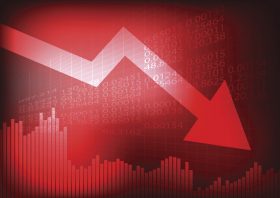Facebook, Oracle Reflect Turn in Tech Sentiment

Technology has been the darling of the stock market for the past few years. But it can't all be gravy all the time. The recent thumping in some well-known tech names show how fast the tide has turned.
Two large tech stocks -- Facebook (FB) and Oracle (ORCL) -- got hammered today, with both down more than five percent in early trading, although Facebook bounced back a bit. Facebook was down as much as six percent and rallied back to only fall 2 percent, or $4.41, to close near $168. Oracle, meanwhile, got pummeled, falling -4.90 (-9.43%) to $47.05.
Oracle fell after it met earnings expectations but disclosed what the market viewed as weak growth guidance. The software giant reported adjusted earnings of 83 cents per share vs. 72 cents expected by analysts, according to Thomson Reuters. Revenue was $9.77 billion vs. $9.78 billion expected. Oracle CEO Safra Catz said the company expected 19 to 23 percent growth in cloud revenue, including its software platform as a service (PAAS) infrastructure, for the third quarter. Many analysts had expected higher cloud growth approaching 25 percent. That explains the selloff of its shares in the market.
Falling FAANGs
While it's hard to project any generalities based on data points from just two companies, it is instructive. The recent trend is a broad pullback in technology shares, which had been leading the market over the past year. They had simply gotten too hot. Large, powerful tech companies have dominated the market rally. The famous "FAANG" stocks -- Facebook, Apple (AAPL), Amazon (AMZN), Netflix (NFLX) and Google/Alphabet (GOOG) -- recently climbed to a record high share of 25 percent of the total market capitalization of the S&P 500.
At the end of February, FAANGs had gained nearly 20 percent, while the S&P 500 was up a mere two percent. But that has all changed in the last couple weeks, with tech stocks falling hard off their highs. And this week's news hasn't helped -- with Facebook facing a barrage of criticism over its data privacy record and Oracle Corp. having printed disappointing earnings results. Market sentiment on large tech has suddenly turned negative.
Another concern might be that much of the technology growth seems to be inextricably linked to the cloud, which is vulnerable. You post photos on social media, it goes to the cloud. Your enterprise salesforce accesses services in the cloud. You need more storage and infrastructure, so you buy it from Arista (ANET) and Cisco (CSCO). All growth seems to lead back to the cloud.
Cloud Concerns
But what if the cloud is slowing? Or what if security and privacy concerns slow its growth? Or what if the torrid pace of cloud growth over the years cannot keep up with investor expectations?
Although Oracle has not been growing as fast as companies such as Amazon and Facebook, one could extrapolate the results and wonder if too much optimism is built into the market for cloud and tech stocks overall. Oracle executives talked cloud growth, but the bottom line is they have been hyping it for years and it did not live up to expectations. Meanwhile, cloud growth is slowing across the board. The most recent International Data Corporation (IDC) Worldwide Semiannual Public Cloud Services Spending Guide indicates that cloud spending will slow somewhat over the 2016-2021 forecast period, with the market forecast of five-year compound annual growth rate (CAGR) of 21.9% with public cloud services spending at $277 billion in 2021, down from the current growth rate of 23% projected for 2017 to 2018.
As for Facebook, its shares have been hammered on negative press about third-party use of Facebook data and the lack of privacy controls. In contrast, Facebook shares were just hitting all-time highs in January, with a record price of $193 in early January.
The recent trend is a warning about the frothy optimism in tech -- as the euphoria of high-stock prices, tax cuts, and growth projections at the beginning of the year may have overrun the potential to deliver the numbers.




